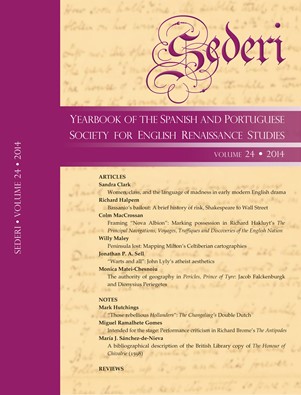“Those rebellious Hollanders”: The Changeling’s Double Dutch
Keywords:
Anglo-Spanish relations, Anglo-Dutch relations, The Changeling, Amboyna massacre, Thomas Middleton, William RowleyAbstract
The Changeling (1622) fits neatly into a familiar anti-Spanish narrative, one so well established in criticism as to obscure the wider international picture. Early in the play a reference to England’s erstwhile ally against Spain is mentioned in passing, and no more is made of the Dutch naval victory over the Spanish in 1607. But this may have resonated in ways that complicated the play’s anti-Spanish sentiment. The enduring resonance of the contemporaneous Amboyna Massacre of 1623 suggests a more complicated reception of The Changeling than critics have allowed for. Even in 1622, when the play was most likely first performed, tensions with the Dutch were on the rise, and the apparent nostalgia for the Protestant alliance which the Treaty of London of 1604 had brought to an end was complicated by the emergence of an empire that would outstrip Spain’s and gradually replace it as England’s chief rival.
Downloads
Downloads
Published
Issue
Section
License
The copyright holder of the published contributions is SEDERI.The hardcopy and an open-access version of the journal will be published simultaneously. The issues will be available online in the SEDERI website (http://www.sederi.org/yearbook/) and other repositories that have signed an agreement with SEDERI.
The authors who publish with this journal agree to the following terms:
a) SEDERI retains copyright of the essay.
b) If the author wishes to republish or rewrite the essay for another journal, or include the essay published in SEDERI in their personal repositories, or in any other way, they should contact the editors to obtain permission to do so. This will entail citing SEDERI as the original source and sending the editors a copy of the new version, or the link to the website, in case of online publishing.
The author(s) hereby warrant(s) that:
a) The essay submitted for publication is an original creation and does not infringe any copyright or property right of another journal, author or publisher.
b) The essay submitted for publication has not been previously published, whole or in part, and is not being considered for publication elsewhere.
c) Written permission has been obtained for any material from other sources included in the essay submitted for publication.




